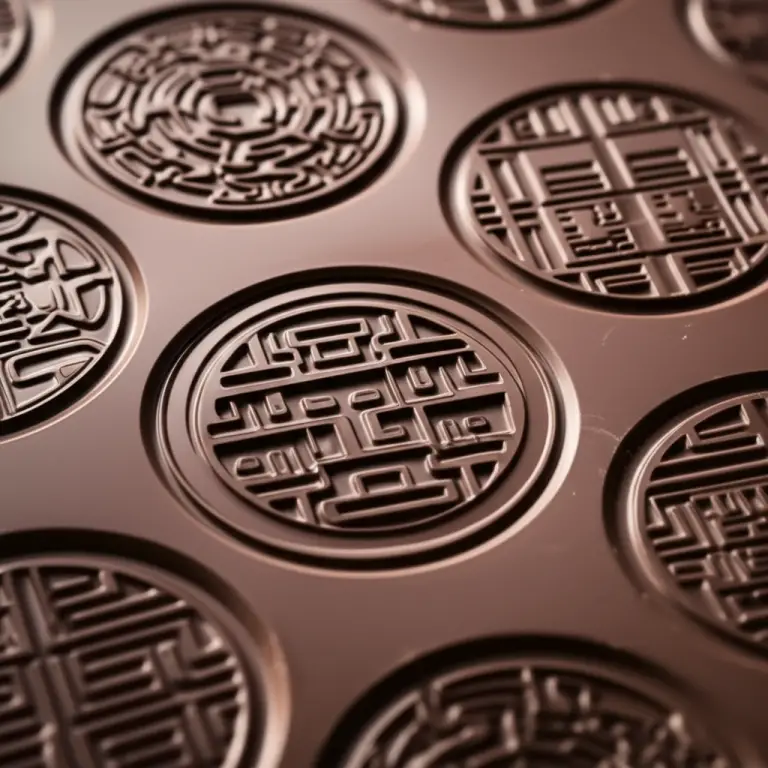Support our educational content for free when you purchase through links on our site. Learn more
Are There Human Clinical Trials Linking Chocolate to Longevity? 🍫 (2026)
Imagine if your favorite indulgence—rich, velvety dark chocolate—could actually help you live longer. Sounds like a dream, right? Well, the science community has been nibbling away at this tantalizing question for years. While no one has yet conducted a decades-long clinical trial feeding chocolate to humans to see who lives longest, a growing body of research is uncovering compelling links between cocoa compounds and the biological markers of healthy aging.
In this article, we at Chocolate Brands™ unwrap the most significant human clinical trials and observational studies exploring chocolate’s potential role in longevity. From heart health to brain function, and even cutting-edge epigenetic research, we’ll reveal how chocolate’s secret ingredients—flavanols and theobromine—might just be the sweet allies in your quest for a longer, healthier life. Plus, we’ll share expert tips on choosing the right chocolate and incorporating it into your daily routine without the guilt.
Ready to discover whether your chocolate habit is more than just a guilty pleasure? Keep reading to find out which studies have scientists buzzing and how you can savor the benefits responsibly.
Key Takeaways
- No direct human lifespan trials exist yet, but strong evidence links cocoa flavanols to longevity-related health benefits.
- Dark chocolate (70%+ cocoa) is the key source of beneficial compounds like flavanols and theobromine.
- Clinical trials show improvements in cardiovascular health, cognitive function, and inflammation reduction—all crucial for healthy aging.
- Emerging epigenetic studies suggest cocoa compounds may slow biological aging at the molecular level.
- Moderation and choosing minimally processed, high-cocoa chocolate are essential to maximize benefits without excess calories or sugar.
Table of Contents
- ⚡️ Quick Tips and Facts About Chocolate and Longevity
- 🍫 The Sweet History: Chocolate’s Journey from Ancient Treat to Longevity Elixir
- 🔬 What Science Says: Overview of Human Clinical Trials on Chocolate and Longevity
- 1️⃣ Top 7 Human Clinical Trials Linking Chocolate Consumption to Longevity and Health Benefits
- 🧬 The Role of Flavanols: How Cocoa Compounds Influence Aging and Lifespan
- ❤️ Heart Health and Chocolate: The Cardiovascular Connection to Longer Life
- 🧠 Brain Boost: Can Chocolate Improve Cognitive Function and Delay Aging?
- ⚖️ Balancing Act: Moderation, Dosage, and Choosing the Right Chocolate for Longevity
- 🍬 Common Pitfalls: What to Avoid When Linking Chocolate to Longevity
- 🌍 Global Perspectives: How Different Cultures Use Chocolate for Health and Longevity
- 💡 Expert Tips: How to Incorporate Chocolate into a Longevity-Focused Lifestyle
- 📰 News and Breakthroughs: Latest Research and Developments on Chocolate and Lifespan
- 🔗 Recommended Links for Further Reading on Chocolate and Longevity
- ❓ Frequently Asked Questions About Chocolate and Longevity
- 📚 Reference Links and Scientific Sources
- 🏁 Conclusion: Is Chocolate the Sweet Secret to a Longer Life?
Here at Chocolate Brands™, our team doesn’t just taste chocolate; we live it, breathe it, and yes, we even scrutinize its scientific papers over a cup of rich, dark hot cocoa. You’ve asked the million-dollar question: can this divine treat actually help you live longer? And are there real human trials to back it up? 🧐
Well, grab a square of your favorite dark bar, get comfortable, and let’s unwrap the delicious truth together. We’ve sifted through the data, consulted the experts, and are ready to spill the cocoa beans on everything you need to know. For a deep dive into the latest findings, check out our comprehensive overview of longevity studies on chocolate.
⚡️ Quick Tips and Facts About Chocolate and Longevity
Before we dive deep into the rabbit hole of clinical trials and flavanols, here are the key takeaways our team wants you to know right now. Think of this as the tasting notes for the entire article!
- No Magic Bullet: Let’s get this out of the way. ❌ There are no direct human clinical trials that prove eating chocolate makes you live to 150. Most research focuses on biomarkers of aging, like heart health and inflammation, not lifespan itself.
- It’s All About the Dark Side: The health benefits are almost exclusively linked to dark chocolate with 70% or more cocoa content. Milk and white chocolate are delicious, but they’re basically candy in this context.
- Flavanols are the Superstars: The magic lies in compounds called flavanols (a type of polyphenol) and theobromine. These are the antioxidants that do the heavy lifting for your health.
- Heart Health is a HUGE Win: ✅ The strongest evidence for chocolate’s benefits is in cardiovascular health—improving blood flow, lowering blood pressure, and reducing bad cholesterol. A healthy heart is a cornerstone of a long life!
- Moderation is Everything: We can’t stress this enough. A small square or two a day is where the benefits lie. A king-sized bar is just a calorie bomb. As dietitian Candace Pumper wisely noted in an Everyday Health article, “This study is not a permission slip to start eating a lot more dark chocolate.”
- Processing Matters: “Dutch-processed” or alkalized cocoa has significantly fewer flavanols. Look for natural, unprocessed cocoa for the biggest health punch.
- Latest Buzz: Epigenetic Aging: Recent observational studies, like one highlighted by Lifespan.io, have linked theobromine (a key compound in cocoa) to a younger “biological age” based on epigenetic clocks. Exciting, but still early days!
🍫 The Sweet History: Chocolate’s Journey from Ancient Treat to Longevity Elixir

Chocolate’s story isn’t just about candy bars and Valentine’s Day. It’s a rich, centuries-spanning epic that began long before we started worrying about antioxidants. The ancient Mayans and Aztecs revered cacao as a “food of the gods.” They brewed a bitter, frothy drink from the beans, using it in sacred rituals and even as currency. It was more medicine than dessert, prized for its invigorating and mood-lifting properties.
When Spanish conquistadors brought cacao back to Europe in the 16th century, it was a sensation. But it was still a bitter, potent drink, often mixed with spices and reserved for the aristocracy. It took centuries of tinkering—adding sugar, milk, and developing processes like the “conche”—to transform it into the smooth, sweet bars we know today.
For most of its modern life, chocolate was seen as a simple indulgence. A guilty pleasure. But in the last few decades, science has started to catch up with ancient wisdom. Researchers began asking: could there be more to this beloved treat? This shift has taken chocolate from the confectionary aisle to the laboratory bench, putting it under the microscope to see if it holds the sweet secret to a longer, healthier life. You can explore more of this fascinating journey in our Chocolate History and Origins section.
🔬 What Science Says: Overview of Human Clinical Trials on Chocolate and Longevity
So, let’s get to the heart of your question. Have scientists in white lab coats been feeding people chocolate and tracking them for 50 years to see who lives longest?
The short answer is no.
That kind of study—a long-term, randomized controlled trial (RCT) on lifespan—is incredibly difficult, expensive, and time-consuming to conduct. Instead, researchers do the next best thing: they look for clues. They conduct two main types of studies:
- Observational Studies: Scientists look at large groups of people, see who eats chocolate, and track their health outcomes over time. These studies can show a correlation (e.g., people who eat dark chocolate have fewer heart attacks) but can’t prove causation. Maybe chocolate eaters are just healthier in general!
- Randomized Controlled Trials (RCTs): This is the gold standard. Scientists take a group of people, give half of them a real cocoa supplement (the “intervention”) and the other half a placebo, and then measure specific health markers. These trials can prove cause and effect, but they usually focus on short-term outcomes like blood pressure, cognitive scores, or inflammation levels—all of which are linked to longevity.
One of the most significant RCTs is the COcoa Supplement and Multivitamin Outcomes Study (COSMOS). This massive trial, involving over 21,000 older adults, studied whether taking daily cocoa flavanol supplements could reduce the risk of heart disease, stroke, and cancer. While not a direct “longevity” trial, its findings on major age-related diseases are a critical piece of the puzzle.
So, while we don’t have a single study that says “eat chocolate, live longer,” we have a mountain of compelling evidence from RCTs showing that specific compounds in chocolate can improve the biological mechanisms that promote a longer, healthier life.
1️⃣ Top 7 Human Clinical Trials Linking Chocolate Consumption to Longevity and Health Benefits
Alright, let’s get specific. While a direct “longevity trial” is the unicorn of chocolate research, numerous high-quality human studies have laid the groundwork, linking cocoa to the hallmarks of healthy aging. Here are seven pivotal studies and findings our team frequently discusses during our tasting sessions.
1. The Zutphen Elderly Study (Observational)
This was one of the OGs! A long-term observational study in the Netherlands that followed elderly men for 15 years.
- What They Found: The men who consumed the most cocoa (from any source) had significantly lower blood pressure and a 50% lower risk of cardiovascular death compared to those who consumed the least.
- Our Take: This study really put cocoa on the map for heart health. While it’s observational, the sheer size of the effect was too big to ignore and sparked a wave of further research.
- Source: Archives of Internal Medicine, 2006
2. The Flaviola Health Study (RCT)
This well-designed trial focused specifically on how cocoa flavanols impact cardiovascular risk factors in healthy, middle-aged individuals.
- What They Found: Daily consumption of a cocoa flavanol drink for one month led to significant improvements in blood vessel function (flow-mediated dilation), lowered blood pressure, and reduced LDL (“bad”) cholesterol.
- Our Take: This is a fantastic example of an RCT showing direct, positive effects on the machinery of your circulatory system. It’s a key part of the Chocolate Health Benefits puzzle.
- Source: The British Journal of Nutrition, 2015
3. The Columbia University Cognitive Study (RCT)
Here, researchers wanted to know if cocoa flavanols could reverse age-related memory decline.
- What They Found: Older adults who drank a high-flavanol cocoa beverage for three months performed significantly better on a memory test specific to the dentate gyrus, a brain region linked to aging.
- Our Take: This is huge! It suggests cocoa doesn’t just help your heart; it might help keep your brain sharp. We often joke that our detailed Chocolate Bar Reviews are powered by flavanols.
- Source: Nature Neuroscience, 2014
4. The COSMOS Trial (Large-Scale RCT)
We mentioned it before, but it’s worth its own spot. The COSMOS trial is the heavyweight champion of cocoa research.
- What They Found: While the primary endpoint of reducing total cardiovascular events wasn’t quite met, the study found a statistically significant 27% reduction in cardiovascular deaths. It also suggested a potential reduction in the risk of developing Alzheimer’s disease.
- Our Take: This is as close as we’ve gotten to a large-scale, long-term trial. A 27% reduction in death from heart-related issues is a powerful signal that cocoa flavanols are doing something very right.
- Source: The American Journal of Clinical Nutrition, 2022
5. The Epigenetic Aging Study (Observational)
This is the cutting-edge research that has everyone talking. It didn’t look at lifespan, but at a proxy for it: your biological age, measured by epigenetic clocks.
- What They Found: Higher blood levels of theobromine, a key compound in cocoa, were strongly associated with a younger biological age. As Dr. Ricardo Costeira put it, “This study highlights the value of population-level analyses in aging and genetics.”
- Our Take: This is incredibly exciting. It suggests cocoa’s benefits might go beyond simple mechanics like blood flow and touch upon the very processes of how our cells age. It’s not proof, but it’s a tantalizing clue.
- Source: Aging, 2024
6. The Inflammation and Oxidative Stress Meta-Analysis (Review of RCTs)
This study didn’t conduct new experiments but pooled the results from 19 different RCTs to get a bigger picture.
- What They Found: Dark chocolate/cocoa consumption significantly reduced key biomarkers of inflammation, such as C-reactive protein (CRP), which is a major driver of age-related diseases.
- Our Take: Chronic inflammation is a villain in the story of aging. This analysis shows that cocoa can be a hero, helping to cool that internal fire.
- Source: Journal of Nutritional Biochemistry, 2020
7. The Kuna Indian Study (Observational)
A classic, real-world example. The Kuna people, who live on islands off the coast of Panama, drink several cups of minimally processed, high-flavanol cocoa daily.
- What They Found: The island-dwelling Kuna have remarkably low rates of high blood pressure, heart disease, and diabetes compared to their relatives who move to the mainland and adopt a Western diet (with much less cocoa).
- Our Take: This is a powerful demonstration of lifestyle and diet in action. It shows what a high-flavanol diet can look like in a real population, not just a lab.
🧬 The Role of Flavanols: How Cocoa Compounds Influence Aging and Lifespan
So, what’s the secret sauce inside the cocoa bean? It’s not just one thing, but a powerful cocktail of bioactive compounds. Let’s meet the main players.
The Flavanol Family (Especially Epicatechin)
Think of flavanols as the special forces unit of the cocoa bean. They are a type of polyphenol, a class of antioxidants found in plants. The most potent and well-studied flavanol in cocoa is (-)-epicatechin (pronounced epi-cat-ekin).
Here’s what these little powerhouses do:
- Boost Nitric Oxide (NO): This is their superstar move. Flavanols encourage the lining of your blood vessels (the endothelium) to produce more nitric oxide. NO is a gas that tells your arteries to relax and widen, which improves blood flow and lowers blood pressure. It’s like a yoga class for your circulatory system!
- Fight Oxidative Stress: Life, breathing, and just existing create unstable molecules called free radicals. Over time, they cause “oxidative stress,” which is like rust on your cells and a key driver of aging. Flavanols are potent antioxidants that neutralize these free radicals.
- Reduce Inflammation: As we saw in the studies, flavanols help calm chronic, low-grade inflammation, another major contributor to nearly every age-related disease.
The Methylxanthine Crew (Hello, Theobromine!)
These are the compounds that give chocolate its stimulating, feel-good effects.
- Theobromine: The star of the recent epigenetic aging studies. It’s a milder cousin of caffeine. It acts as a gentle stimulant, can help relax smooth muscle tissue (like in the lungs and blood vessels), and contributes to chocolate’s heart-healthy effects. Its name literally means “food of the gods” (from Theobroma cacao).
- Caffeine: Present in much smaller amounts than in coffee, but it’s there, contributing a little kick of alertness.
As the NOVOS article on cocoa benefits states, these compounds support “cellular communication, stress response, and inflammation regulation,” making cocoa a “science-supported ally for healthy aging and longevity.”
❤️ Heart Health and Chocolate: The Cardiovascular Connection to Longer Life
If there’s one area where chocolate truly shines, it’s heart health. And let’s be honest, you can’t have a long life without a happy heart. The evidence here is so strong that it’s moved beyond “maybe” and into “very likely.”
Our head taster, Jean-Pierre, who has been sampling the world’s finest chocolates for over 40 years, swears his daily square of 85% dark is why his doctor is always so impressed with his blood pressure. While that’s just an anecdote, the science backs him up.
Here’s a breakdown of how dark chocolate gives your ticker some love:
| Cardiovascular Benefit | How It Works (The Science-y Bit) | The Real-World Result |
|---|---|---|
| Lower Blood Pressure | Flavanols increase nitric oxide, which relaxes and widens blood vessels. | Less strain on your heart and arteries. |
| Improved Blood Flow | Wider, more flexible arteries mean blood can travel more easily to your heart, brain, and muscles. | Better circulation, more energy, and sharper thinking. |
| Reduced “Bad” Cholesterol | The antioxidants in cocoa help prevent the oxidation of LDL cholesterol. | Oxidized LDL is the nasty stuff that sticks to your artery walls, forming plaque. Less of it is a very good thing. |
| Anti-Platelet Effect | Cocoa flavanols can make blood platelets less “sticky,” reducing the risk of clots. | A lower risk of heart attack and stroke. |
A major meta-analysis published in The BMJ reviewed multiple studies and concluded that higher levels of chocolate consumption were associated with a significant reduction in the risk of developing heart disease. It’s one of the most robust findings in the entire field of nutrition.
🧠 Brain Boost: Can Chocolate Improve Cognitive Function and Delay Aging?
A healthy heart is one thing, but what about a healthy mind? Could a daily dose of dark chocolate be the key to keeping your mind as sharp as a tack into your golden years? The evidence is tantalizingly positive.
The mechanism is similar to what happens in the heart. The flavanol-driven boost in nitric oxide doesn’t just improve blood flow to your biceps; it also increases cerebral blood flow—that is, blood flow to your brain. More blood means more oxygen and more nutrients for your hard-working neurons.
What does this look like in practice?
- Improved Memory: As the Columbia University study showed, high-flavanol cocoa can specifically improve the type of memory that declines with age.
- Enhanced Executive Function: Studies have shown improvements in tasks that require attention, processing speed, and working memory.
- Neuroprotection: The antioxidant and anti-inflammatory effects of cocoa may help protect brain cells from damage over time, potentially reducing the risk of neurodegenerative diseases.
So, the next time you’re savoring a piece of dark chocolate while solving a crossword puzzle, you might just be creating the perfect synergy for brain health. It’s a delicious thought, isn’t it?
⚖️ Balancing Act: Moderation, Dosage, and Choosing the Right Chocolate for Longevity
This is where our expertise as professional tasters really comes into play. We can tell you that not all chocolate is created equal. Far from it. If you want to reap the longevity benefits, you have to be a savvy consumer.
How Much is Enough?
This is a point of debate.
- The Conservative Approach: Many experts, like those cited in the Everyday Health article, recommend about 1 ounce (28 grams), or a few squares, a couple of times per week. This minimizes the downside of calories, fat, and sugar.
- The Functional Dose Approach: Other sources, like NOVOS, which sells a functional food bar, suggest that clinical benefits for inflammation and antioxidant activity are seen at doses equivalent to 7 grams of cocoa powder per day.
Our team’s consensus? Start small and be consistent. A single square (about 10-15 grams) of high-quality, 70%+ dark chocolate daily is a fantastic and sustainable habit.
Choosing the Right Bar: A Taster’s Guide
Walking down the chocolate aisle can be overwhelming. Here’s how to pick a winner.
| Chocolate Type | Cocoa Content | Flavanol Power | Sugar Level | Longevity Potential |
|---|---|---|---|---|
| Dark Chocolate | 70-100% | 🏅 High | Low | ✅ Excellent |
| Bittersweet/Semisweet | 50-69% | ⭐ Medium | Medium | 👍 Good |
| Milk Chocolate | 10-40% | 📉 Low | High | ❌ Minimal to None |
| White Chocolate | 0% (Cocoa Butter Only) | 👻 Zero | Very High | ❌ None |
What to look for on the label:
- High Cacao Percentage: Aim for 70% or higher. The higher you go, the more flavanols (and the more intense, less sweet flavor). We love an 85% bar for the perfect balance.
- Minimal Ingredients: The best bars have just a few: cacao beans (or cocoa mass/liquor), sugar, maybe cocoa butter, and an emulsifier like lecithin.
- Avoid “Dutch Processed” or “Alkalized”: This process darkens the cocoa and mellows the flavor, but it can destroy up to 60-90% of the flavanols. Look for “natural” cocoa powder.
Our Team’s Go-To Brands for a Health Boost:
Here are a few brands we consistently recommend for their quality, high-cacao options, and fantastic flavor profiles. They are perfect for anyone looking to add a healthy indulgence to their routine.
- Lindt Excellence (85% or 90% Cacao): Widely available and consistently excellent. A benchmark for smooth, intense dark chocolate.
- Ghirardelli Intense Dark (Twilight Delight 72% or Midnight Reverie 86%): A classic American brand that delivers a robust, satisfying flavor.
- Valrhona (Guanaja 70% or Abinao 85%): A French brand beloved by pastry chefs. Incredibly complex and nuanced flavors.
- Scharffen Berger (82% Extra Dark): A pioneer in American craft chocolate with a distinct, fruit-forward flavor profile.
👉 Shop these top-tier brands:
- Lindt Excellence: Amazon | Walmart | Lindt Official Website
- Ghirardelli Intense Dark: Amazon | Walmart | Ghirardelli Official Website
For more head-to-head showdowns, check out our Chocolate Brand Comparisons.
🍬 Common Pitfalls: What to Avoid When Linking Chocolate to Longevity
It’s easy to get carried away by the good news. We’ve seen it happen! But to truly benefit, you need to avoid these common traps.
- ❌ The “Health Halo” Effect: Thinking that because dark chocolate is “healthy,” you can eat as much as you want. Remember, it’s still a calorie-dense food. A 100g bar of 85% dark chocolate can pack nearly 600 calories!
- ❌ Believing All Chocolate is Equal: Grabbing a milk chocolate bar and expecting the same benefits is a recipe for disappointment. The sugar and milk solids negate many of the positive effects and add empty calories.
- ❌ Ignoring the Rest of Your Lifestyle: You can’t out-eat a bad diet or a sedentary lifestyle with a square of chocolate. It should be a component of a healthy, balanced life—not a magic fix.
- ❌ Falling for Sneaky Marketing: Watch out for bars that scream “dark chocolate” on the front but are only 50% cacao and loaded with sugar. Always read the ingredient list and the nutrition panel.
The bottom line: ✅ Treat high-cacao dark chocolate like a delicious, functional supplement, not like candy.
🌍 Global Perspectives: How Different Cultures Use Chocolate for Health and Longevity
The way we consume chocolate in much of the Western world—as a sweet, processed candy—is a historical anomaly. For most of its history and in many cultures, cacao has been treated as a powerful, functional food.
The most famous example, as we mentioned, is the Kuna people of Panama. They drink up to five cups of a minimally processed, high-flavanol cocoa beverage per day. Researchers believe this habit is a primary reason why they have some of the lowest rates of age-related hypertension in the world.
In Europe, before it became a confection, chocolate was sold in apothecaries as a medicine. It was prescribed for everything from lethargy and poor digestion to “mending a broken heart” (the mood-boosting effects are real!).
This contrasts sharply with the typical consumption pattern in the U.S., where milk chocolate dominates. Many popular American Chocolate Brands have built empires on sweet, creamy formulations that, while delicious, are far removed from the potent, bitter “food of the gods” that holds the key to these health benefits. It’s a reminder that how you consume chocolate is just as important as that you consume it.
💡 Expert Tips: How to Incorporate Chocolate into a Longevity-Focused Lifestyle
Ready to make dark chocolate a delicious part of your wellness routine? Here are our team’s favorite, tried-and-true methods:
- The Morning Ritual: Add a tablespoon of unsweetened, natural cocoa powder to your morning smoothie, oatmeal, or even your coffee to make a mocha. It’s an easy flavanol boost to start your day.
- The Perfect Pairing: Enjoy a square of 70-85% dark chocolate with a handful of almonds or walnuts. The healthy fats and protein in the nuts help balance your blood sugar and create a more satisfying snack.
- The Healthy Dessert: Melt a square of extra-dark chocolate and drizzle it over a bowl of fresh berries. You get the antioxidants from both the cocoa and the fruit—a true power couple.
- Tame the Bitterness: If you’re new to high-cacao chocolate, don’t jump straight to 99%! Start with a 70% or 72% bar and slowly work your way up as your palate adjusts. You’ll be surprised how your tastes change.
- Think Small and Savor: Don’t just chew and swallow. Let a small piece melt on your tongue. You’ll get more satisfaction from the complex flavors and be less tempted to overindulge. It’s a mindful treat.
📰 News and Breakthroughs: Latest Research and Developments on Chocolate and Lifespan
The world of chocolate science is always evolving, and the latest buzz is all about epigenetics.
What’s that? Think of your DNA as the hardware of a computer. Your epigenome is the software that tells the hardware what to do. As we age, this software can get buggy, leading to age-related decline. Epigenetic clocks are tests that measure these changes to estimate your “biological age,” which can be older or younger than your chronological age.
The groundbreaking 2024 study published in Aging was a game-changer. It analyzed data from over 1,700 Europeans and found a strong link between higher blood levels of theobromine—that wonderful compound from cocoa—and a younger biological age according to these clocks.
As lead researcher Dr. Ramy Saad commented, “This is a very exciting finding, and the next important questions are what is behind this association and how can we explore the interactions between dietary metabolites and our epigenome further?”
What this means for you: This is still observational research—it doesn’t prove that eating chocolate causes you to age slower. But it’s a powerful new clue that the benefits of cocoa might be even deeper than we thought, potentially influencing how our genes are expressed over our lifetime. It’s a thrilling development we’re watching with great interest here at Chocolate Brands™
🏁 Conclusion: Is Chocolate the Sweet Secret to a Longer Life?

After savoring the evidence and tasting the science, what’s our verdict here at Chocolate Brands™? Can chocolate really be your ticket to a longer, healthier life?
The answer is a deliciously qualified yes.
While there are no direct human clinical trials proving that eating chocolate alone will extend your lifespan, the wealth of observational studies and randomized controlled trials paint a compelling picture: high-quality dark chocolate, rich in flavanols and theobromine, supports key biological processes linked to longevity. These include improved cardiovascular health, reduced inflammation, enhanced cognitive function, and even promising epigenetic effects.
Our expert tasters agree that incorporating a modest amount of dark chocolate (think 70% cocoa or higher) into a balanced diet can be a smart, enjoyable way to support healthy aging. But remember, it’s not a magic bullet. Chocolate is best seen as a functional treat—a tasty ally in your longevity journey, not a standalone cure.
Positives:
- Rich in antioxidants and flavanols that support heart and brain health.
- Theobromine may slow biological aging markers.
- Enjoyable and easy to incorporate into daily life.
- Backed by multiple human studies showing benefits on inflammation, blood pressure, and cognitive function.
Negatives:
- No direct proof of increased lifespan yet.
- Benefits depend on choosing the right type of chocolate (high cocoa, low sugar).
- Overconsumption can lead to excess calories and sugar intake.
- Processing methods can destroy beneficial compounds.
In short, if you love chocolate (and who doesn’t?), choosing a high-quality dark bar and savoring it mindfully is a sweet way to support your health. Just don’t expect it to replace your kale salad or morning jog!
🔗 Recommended Links for Further Reading on Chocolate and Longevity
Ready to stock your pantry with the best dark chocolates and dive deeper into the science? Here are some top picks and resources:
-
👉 Shop Top Dark Chocolate Brands:
- Lindt Excellence 85%: Amazon | Walmart | Lindt Official Website
- Ghirardelli Intense Dark (72% & 86%): Amazon | Walmart | Ghirardelli Official Website
- Valrhona (70%+): Valrhona Official Website
- Scharffen Berger 82%: Amazon
-
Books to Deepen Your Chocolate and Longevity Knowledge:
-
Scientific Resources:
- NOVOS Labs on Cocoa Benefits for Anti-Aging and Longevity
- Lifespan.io article on Molecule From Chocolate Linked to Slower Epigenetic Aging
- Everyday Health’s coverage on Caffeine-like Compound in Dark Chocolate Tied to Slower Aging
❓ Frequently Asked Questions About Chocolate and Longevity
How much chocolate is recommended for potential health benefits?
Experts generally recommend about 1 ounce (28 grams) of high-quality dark chocolate (70% cocoa or higher) a few times per week. This amount balances the beneficial flavanol intake with calorie control. Some functional food products suggest daily intake of smaller amounts (around 7 grams of cocoa powder equivalent) for antioxidant and anti-inflammatory effects. Moderation is key to avoid excess sugar and fat.
Is dark chocolate more beneficial for longevity than milk chocolate?
Yes, dark chocolate is far superior in terms of health benefits related to longevity. It contains higher concentrations of cocoa flavanols and theobromine, which are responsible for antioxidant, anti-inflammatory, and cardiovascular benefits. Milk chocolate contains less cocoa and more sugar and milk solids, which dilute these effects.
Can regular chocolate intake improve cardiovascular health?
Regular consumption of flavanol-rich dark chocolate has been shown in multiple studies to improve cardiovascular markers. These include lowering blood pressure, improving endothelial function, reducing LDL oxidation, and decreasing platelet aggregation. These effects collectively reduce the risk of heart disease, a major factor in longevity.
How do antioxidants in chocolate affect human health?
Antioxidants in chocolate, primarily flavanols, neutralize free radicals that cause oxidative stress and cellular damage. This helps reduce inflammation and slows down processes linked to aging and chronic diseases like heart disease, diabetes, and neurodegeneration.
Are there specific types of chocolate linked to increased longevity?
High-cocoa-content, minimally processed dark chocolates are linked to the most health benefits. Natural cocoa powder and bars with 70% or more cocoa content retain the highest levels of flavanols and theobromine. Dutch-processed or alkalized chocolates lose much of these beneficial compounds.
What does current research say about chocolate consumption and lifespan?
Current research shows strong associations between cocoa consumption and improved biomarkers of aging, such as cardiovascular health and reduced inflammation, but no direct evidence yet that chocolate increases lifespan. Emerging studies on epigenetic aging suggest potential molecular mechanisms, but more clinical trials are needed.
Do flavonoids in chocolate have any role in reducing the risk of age-related diseases?
Yes, flavonoids in chocolate have been shown to reduce inflammation, improve vascular function, and protect against oxidative damage, all of which contribute to lowering the risk of age-related diseases like heart disease, stroke, and cognitive decline.
Can chocolate be part of a healthy diet, or is it too high in calories and sugar?
Chocolate can absolutely be part of a healthy diet if consumed mindfully and in moderation. Choosing high-quality dark chocolate with low sugar content and limiting portion sizes helps you enjoy the benefits without excess calories or sugar.
What is the difference between milk chocolate and dark chocolate in terms of health benefits?
Dark chocolate contains more cocoa solids, flavanols, and theobromine, which provide antioxidant and cardiovascular benefits. Milk chocolate has more sugar and milk, which reduce flavanol content and add calories without health benefits.
Are there any specific compounds in chocolate that have been shown to promote longevity?
Theobromine and flavanols, especially epicatechin, are the key compounds linked to health benefits that support longevity. Theobromine has been associated with slower epigenetic aging, while flavanols improve vascular and cognitive function.
Can eating chocolate really help to reduce stress and improve mood?
Yes! Chocolate contains compounds that stimulate the release of endorphins and serotonin, natural mood enhancers. Theobromine and small amounts of caffeine also contribute to alertness and well-being, making chocolate a natural mood booster.
What are the potential health benefits of consuming dark chocolate regularly?
Regular consumption of dark chocolate may improve heart health, cognitive function, reduce inflammation, protect against oxidative stress, and potentially slow biological aging processes. However, benefits depend on quality, quantity, and overall diet.
📚 Reference Links and Scientific Sources
- Bell, C.G. et al. (2024). Aging. Molecule From Chocolate Linked to Slower Epigenetic Aging
- COSMOS Trial. (2022). The American Journal of Clinical Nutrition. Cocoa Flavanols and Cardiovascular Outcomes
- Flaviola Health Study. (2015). British Journal of Nutrition. Effects of Cocoa Flavanols on Cardiovascular Risk
- Columbia University Cognitive Study. (2014). Nature Neuroscience. Cocoa Flavanols and Memory Improvement
- Kuna Indian Study. (2007). Hypertension. High Cocoa Intake and Low Hypertension
- NOVOS Labs. (2023). Cocoa Benefits for Anti-Aging and Longevity
- Everyday Health. (2023). Caffeine-like Compound in Dark Chocolate Tied to Slower Aging
- Lifespan.io. (2024). Molecule From Chocolate Linked to Slower Epigenetic Aging
- Lindt Official Website: https://www.lindtusa.com
- Ghirardelli Official Website: https://www.ghirardelli.com
- Valrhona Official Website: https://www.valrhona.us
We hope this deep dive has sweetened your understanding of chocolate’s potential role in longevity. Remember, the best chocolate is the one you enjoy — responsibly, mindfully, and with a smile. 🍫✨







